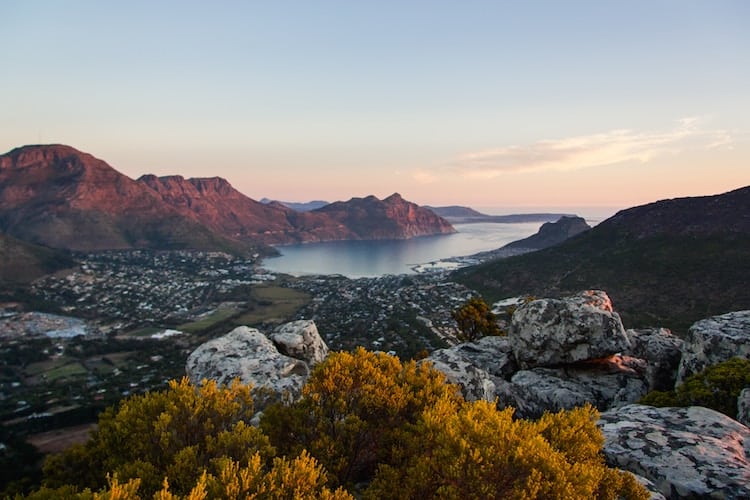Travel
Cape Town — Beyond Expectations

Richard Carroll gives us a tour to Cape Town – the Mother city of South Africa.
TRAVEL AND ADVENTURE
RELEASE: SATURDAY, DECEMBER 2, 2017
Cape Town — Beyond Expectations
By Richard Carroll
Tucked away at the southern tip of the African continent in a glorious setting of steep-sided mountains and rugged coastline that wanders around the Cape Peninsula like a fluttering silk ribbon, Cape Town quickly captures the imagination and excites those eager for adventures.
Ranked among the world's great view cities, the city is anchored by one of the continent's best-known landmarks, towering Table Mountain. Rising skyward from the heart of the city, it often stretches beyond the clouds like a faithful sentinel.
From atop Table Mountain, the marvelous vistas that captivate Capetonians and visitors alike are enhanced each evening by sunsets that fill the sky with a splendid glow. Cable cars with rotating floors offering a 360-degree panorama of city and countryside carry view-seekers 3,500 feet up the mountain — from the waters of the Atlantic and Indian oceans, past the meandering coastline, up and over the mountains and valleys, and back to the coastline and ocean waters.
Cape Town is a revered African focal point and a playground of enormous proportions. Wonderfully progressive and affectionately known as the “Mother City of South Africa,” the city is alive with developing post-apartheid optimism boosted by free elections in 1994, when Nelson Mandela became president.
Splendidly civilized with 11 official languages, the English-speaking city from a physical and cultural perspective is a blend of Africa and the culture of Europe. It has a future without boundaries and an admirable dedication to fine arts, historical buildings, expansive gardens and winemaking.
[amazon box=”1920545980″]
The Cape region is a sprawling domain with thousands of wine labels, created by wine producers with plantings dating to 1655. A dramatic bonus for the booming wine industry is a succulent and earthy cuisine called Modern South African, which has been recognized throughout Europe by food and wine aficionados.
Cape Town's multicultural food and wine heritage is an eclectic mix of the vibrant culture of Europe, including the Dutch, French and Portuguese. Further to this eclectic kaleidoscope and the most influential in the country's culinary heritage are the Africans, Indians, Malays and Javanese wine workers who were first established as slaves.
Excellent fishermen and skilled cooks, they brought with them fennel, cardamom, aniseed, ginger and Indonesian masalas, a succulent blend of spices, while introducing tasty dishes such as Bobotie, a spicy minced lamb dish, prepared with enough variations to keep your tummy singing for weeks.
A splendid introduction to the merging South African cuisine is the Planet Restaurant and Oasis Bistro in the palatial Belmond Mount Nelson Hotel. Built in 1899 at the foot of Table Mountain, surrounded by lush gardens and ranked among the best dining experiences in Africa, the property has hosted everyone from Winston Churchill and John Lennon to Sir Arthur Conan Doyle and Agatha Christie.
[amazon box=”B0756D5P9S”]
Minutes away at the bustling Victoria and Albert Waterfront District, street entertainers juggle and dance while other Capetonians browse the shops and enjoy sidewalk cafes. At the Hildebrand Restaurant, ensconced in the oldest building on the Pier Head (1903), diners savor cold-water Namibia oysters grown on the current or large Cape Rock Lobster. They can hear African groups singing along the promenade while watching boats chugging to and fro in the harbor.
Downtown Kloof Street, home to 30 or so restaurants, is mere minutes away, and the must-see list should include earthy Long Street, bursting with bookstores, coffee shops and the sizzling night spot, Mama Africa. Bohemian and wonderfully free-spirited, Mama Africa is the place to hear live authentic South African music and meet a cross-section of Capetonians to observe their zest for life.
It's a room reminiscent of Paris on the Left Bank and earthy San Francisco jazz clubs. Talented musicians sing in unison while others playing marimbas, conga, bongo and kettle drums, making the old green snake cement bar twitch, the dusty chandelier sway and the ceiling art shine.
Two contrasting must-visits are to the Robben Island Museum, a dramatic and heart-tugging UNESCO World Heritage Site where Nelson Mandela was imprisoned, and the Cape Floral Kingdom, the smallest and richest of the world's six Floral Kingdoms. Nowhere else on earth are as many plants found as in this narrow belt of mountains extending along the coast from Cape Town to Port Elizabeth.
Touring the Cape region is a glorious day of adventure along a two-lane road carved out of a steep-sided mountain that winds high above the ocean and offers stunning views of the peninsula and Chapman's Peak to the oldest working lighthouse in South Africa (1822-24) and colonies of the black-footed penguins. Spectacular walking trails extend along the seaside promenade shared by snooty baboons that scramble into cars in search of a snack.
At the Cape Point Nature Preserve, noted for treacherous waters and one of the windiest places in the world in summer, you can see the Cape of Good Hope, the most southwest point in Africa. The foolhardy can stop at False Bay, one of the only places in the world that is a breeding ground for the great white shark, and dive with them for a first-hand glimpse of gleaming teeth in search of something meaty.
WHEN YOU GO
For more information, visit www.country.southafrica.net and www.capetown.travel.
Richard Carroll is a freelance writer. To read features by other Creators Syndicate writers and cartoonists, visit the Creators Syndicate website at www.creators.com.
COPYRIGHT 2017 CREATORS.COM








2 Comments
Always good in town,but wine country cross the mountains even better!!!!
Obviously this was written before it was known that Cape Town will run out of water in a matter of weeks.